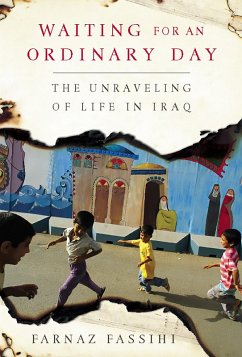Farnaz Fassihi, The Wall Street Journal's intrepid senior Middle East correspondent, bridges this gap by unveiling an Iraq that has remained largely hidden since the United States declared their "Mission Accomplished." Fassihi chronicles the experience of the disenfranchised as they come to terms with the realities of the overthrow of Saddam Hussein. In an unforgettable portrait of Iraqis whose voices have remained eerily silent -- from art gallery owners to clairvoyants, taxi drivers to radicalized teenagers -- Fassihi brings to life the very people whose goodwill the U.S. depended upon for a successful occupation. Haunting and lyrical, Waiting for An Ordinary Day tells the long-awaited story of post-occupation Iraq through native eyes.
Dieser Download kann aus rechtlichen Gründen nur mit Rechnungsadresse in A, B, BG, CY, CZ, D, DK, EW, E, FIN, F, GR, HR, H, IRL, I, LT, L, LR, M, NL, PL, P, R, S, SLO, SK ausgeliefert werden.









